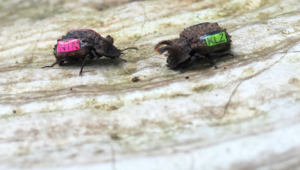Tuesday January 9th
MCZ 101, 26 Oxford Street, Harvard University
07:30 PM
Natural selection and social networks in a horned beetle
Vince Formica
Swarthmore College
 “All of life is social.” This quote by biologist Steven Frank drives home a simple fact about all living organisms: At some point in their lives they interact with members of their own species and those interactions have consequences for their success and ultimately the population’s evolution.
“All of life is social.” This quote by biologist Steven Frank drives home a simple fact about all living organisms: At some point in their lives they interact with members of their own species and those interactions have consequences for their success and ultimately the population’s evolution.
And yet, we still don’t fully understand: how do complex social behaviors evolve in nature? Social network analysis allows us to quantify the behavior of animals at the individual and the emergent, group level.
In this talk I will discuss my work on the evolution of social networks in the forked fungus beetle (Bolitotherus cornutus). Forked fungus beetles are charismatic insects that are found in eastern North American forests, and can live for several years in populations on decaying logs. Most importantly, they exhibit observable social interactions, such as courtship dances and male combat.
Every summer my team of undergraduate students and I track 20 populations of forked fungus beetles in an old-growth forest, mark and release hundreds of individuals, and record tens of thousands of interactions each year. I’ll discuss how the sign and magnitude of sexual selection for social networks is drastically different among populations that are only a few meters from each other. Together we’ll explore how combinations of traits (beetle horns and social network positions) can interact to make complex selective surfaces that could shape the evolution of behavior and morphology.
 The talk is free and open to the public. The meeting is readily accessible via public transportation. Parking is available in the Oxford Street Garage with advance arrangement, as described here, or (usually but not always) at spaces on nearby streets. Everyone is also welcome to join us for dinner before the talk (beginning at 5:45 PM) at the Cambridge Common, 1667 Mass Ave., Cambridge.
The talk is free and open to the public. The meeting is readily accessible via public transportation. Parking is available in the Oxford Street Garage with advance arrangement, as described here, or (usually but not always) at spaces on nearby streets. Everyone is also welcome to join us for dinner before the talk (beginning at 5:45 PM) at the Cambridge Common, 1667 Mass Ave., Cambridge.
CEC meetings are held the second Tuesday of the month from October through May. The evening schedule typically includes an informal dinner (5:45 to 7:15 PM) followed by our formal meeting (7:30 – 9:00 PM). The latter begins with club business and is followed by a 50 minute entomology related presentation. Membership is open to amateur and professional entomologists.




